通用 小升初英语总复习 一般疑问句和特殊疑问句讲解课件(32张幻灯片)
文档属性
| 名称 | 通用 小升初英语总复习 一般疑问句和特殊疑问句讲解课件(32张幻灯片) |

|
|
| 格式 | pptx | ||
| 文件大小 | 478.2KB | ||
| 资源类型 | 教案 | ||
| 版本资源 | 通用版 | ||
| 科目 | 英语 | ||
| 更新时间 | 2021-04-17 00:00:00 | ||
图片预览

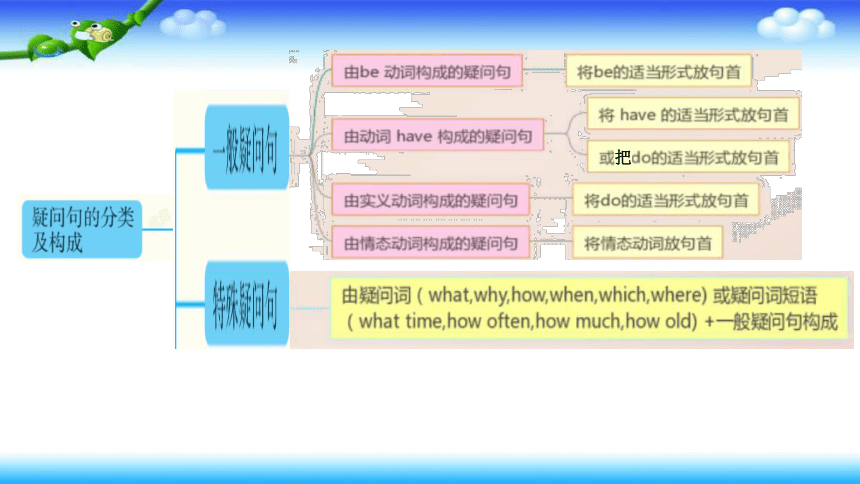
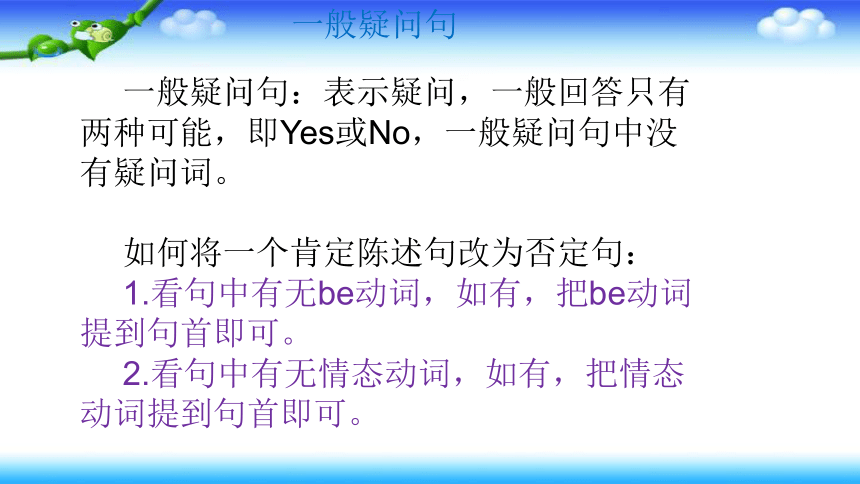
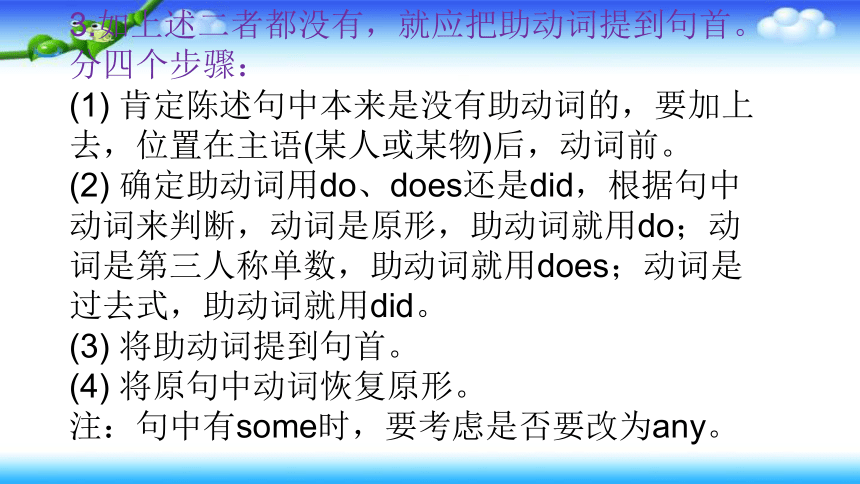

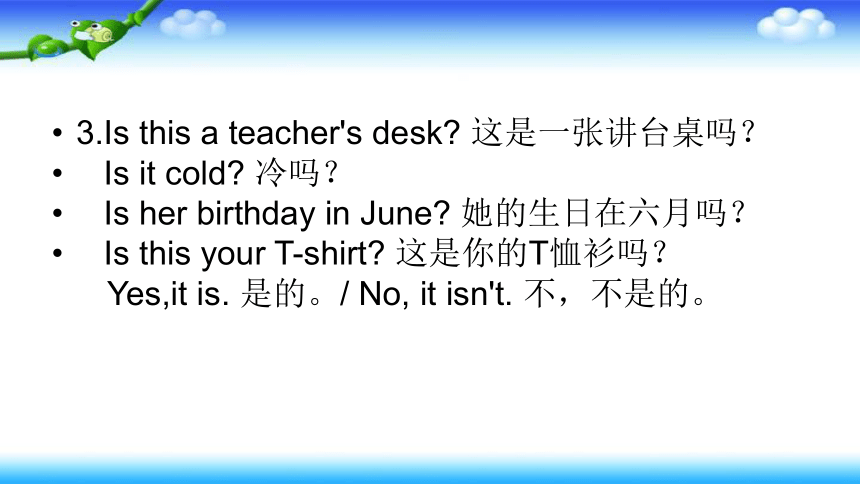
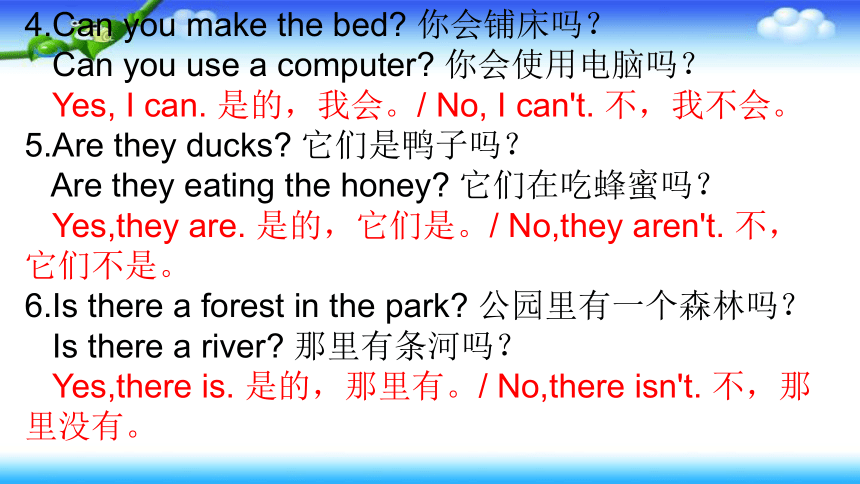
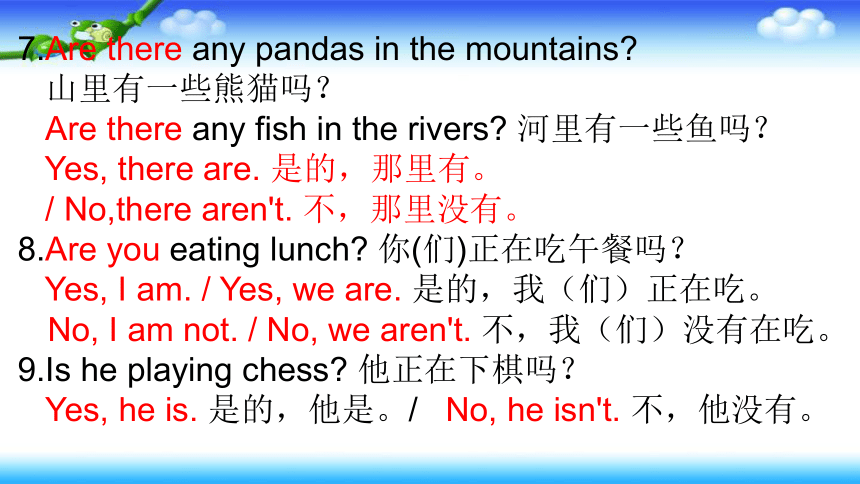
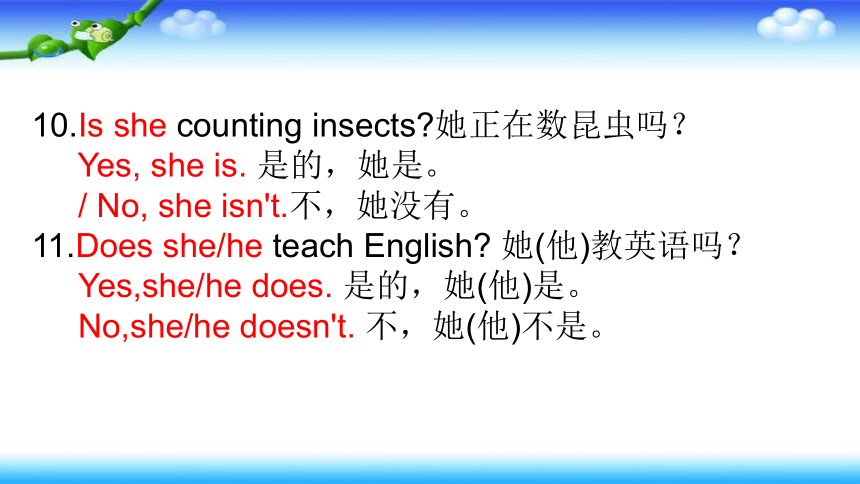
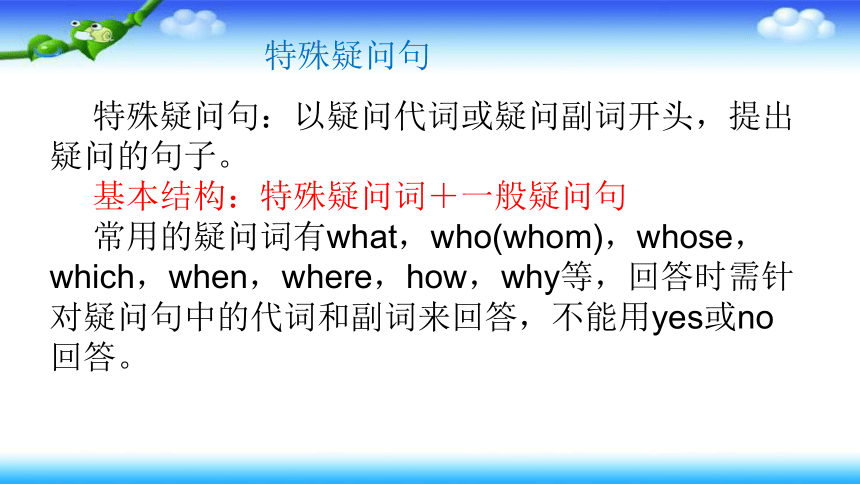
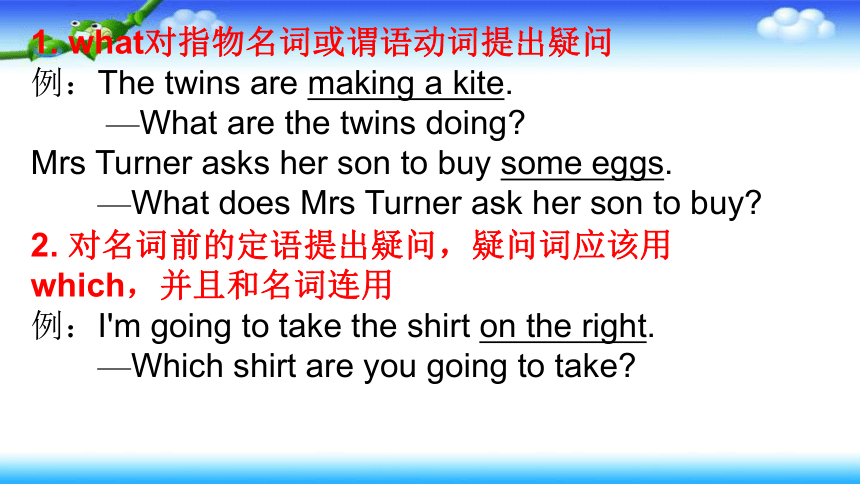

文档简介
疑问句
把
一般疑问句:表示疑问,一般回答只有两种可能,即Yes或No,一般疑问句中没有疑问词。
如何将一个肯定陈述句改为否定句:
1.看句中有无be动词,如有,把be动词提到句首即可。
2.看句中有无情态动词,如有,把情态动词提到句首即可。
一般疑问句
3.如上述二者都没有,就应把助动词提到句首。分四个步骤:
(1) 肯定陈述句中本来是没有助动词的,要加上去,位置在主语(某人或某物)后,动词前。
(2) 确定助动词用do、does还是did,根据句中动词来判断,动词是原形,助动词就用do;动词是第三人称单数,助动词就用does;动词是过去式,助动词就用did。
(3) 将助动词提到句首。
(4) 将原句中动词恢复原形。
注:句中有some时,要考虑是否要改为any。
1.—Did you read books? 你读书了吗?
—Yes, I did.是的,我读过了。
/ No, I didn't. 不,我没有读过。
2.①—Is she quiet? 她文静吗?
—No, she isn't. She's very active. 不,她不文静。她很活跃。
②—Is she strict? 她严格吗?
—Yes, she is, but she's very kind.是的,但是她很和蔼。
3.Is this a teacher's desk? 这是一张讲台桌吗?
Is it cold? 冷吗?
Is her birthday in June? 她的生日在六月吗?
Is this your T-shirt? 这是你的T恤衫吗?
Yes,it is. 是的。/ No, it isn't. 不,不是的。
4.Can you make the bed? 你会铺床吗?
Can you use a computer? 你会使用电脑吗?
Yes, I can. 是的,我会。/ No, I can't. 不,我不会。
5.Are they ducks? 它们是鸭子吗?
Are they eating the honey? 它们在吃蜂蜜吗?
Yes,they are. 是的,它们是。/ No,they aren't. 不,它们不是。
6.Is there a forest in the park? 公园里有一个森林吗?
Is there a river? 那里有条河吗?
Yes,there is. 是的,那里有。/ No,there isn't. 不,那里没有。
7.Are there any pandas in the mountains?
山里有一些熊猫吗?
Are there any fish in the rivers? 河里有一些鱼吗?
Yes, there are. 是的,那里有。
/ No,there aren't. 不,那里没有。
8.Are you eating lunch? 你(们)正在吃午餐吗?
Yes, I am. / Yes, we are. 是的,我(们)正在吃。
No, I am not. / No, we aren't. 不,我(们)没有在吃。
9.Is he playing chess? 他正在下棋吗?
Yes, he is. 是的,他是。/ No, he isn't. 不,他没有。
10.Is she counting insects?她正在数昆虫吗?
Yes, she is. 是的,她是。
/ No, she isn't.不,她没有。
11.Does she/he teach English? 她(他)教英语吗?
Yes,she/he does. 是的,她(他)是。
No,she/he doesn't. 不,她(他)不是。
特殊疑问句
特殊疑问句:以疑问代词或疑问副词开头,提出疑问的句子。
基本结构:特殊疑问词+一般疑问句
常用的疑问词有what,who(whom),whose,which,when,where,how,why等,回答时需针对疑问句中的代词和副词来回答,不能用yes或no回答。
1. what对指物名词或谓语动词提出疑问
例:The twins are making a kite.
—What are the twins doing?
Mrs Turner asks her son to buy some eggs.
—What does Mrs Turner ask her son to buy?
2. 对名词前的定语提出疑问,疑问词应该用which,并且和名词连用
例:I'm going to take the shirt on the right.
—Which shirt are you going to take?
3. 对名词前的定语提出疑问,疑问词应该用which,并且和名词连用
例:I'm going to take the shirt on the right.
—Which shirt are you going to take?
4.对指人名词或人称代词提问用who
例:Li Ping is my sister. —Who is Li Ping?
5.对物主代词和名词所有格提问用whose
例:Li Ping's coat—whose coat
my father—whose father
6.对具体时间提出疑问,疑问词用when;对具体几点钟提问,用what time
例:It's 10:00. —What time is it?
I go home at night. —When do you go home?
7.对具体地点提问,疑问词用where
例:The boys are having a picnic in the park.
—Where are the boys having a picnic?
8.对标原因的从句提问,常见的为because引导的从句,疑问词用why
例:Tom didn't go to the farm with us because he was ill.
—Why didn't Tom go to the farm with us?
9.对方式或程度等提出疑问,用疑问词how
例:He likes apples very much.—How does he like apples?
10.对数量提出疑问,疑问词为how many/much 要注意后面名词接复数形式
例:There are two sheep. —How many sheep are there?
11.对价格提问,疑问词用how much
例:I pay fifty yuan for the sweater.
—How much do you pay for the sweater?
12.对时间长度提问,用how long
例:I work in that factory for two years.
—How long do you work in that factory?
13.对频率提问,如:once a year,twice a week,
用how often
例:I swim once a week. —How often do you swim?
14.对具体次数提问,如:once,twice,three
times,用how many times
例:How many times did he call you the day before yesterday?
15.对距离提问,用how far
例:It's about two kilometres from here.
—How far is it from here?
16.对日期、星期、天气提问,分别用:
What's the date?
What day is it?
What's the weather like?
问句的类型
一般疑问句
特殊疑问句
一般疑问句:
用Yes或No作答的疑问句叫一般疑问句。一般疑
问句还有下列特点:
1.以be动词、助动词或情态动词开头;
例:Is your father a teacher?
Does Catherine like animals?
Can Jenny speak French?
2.往往读升调;
3.译成汉语,都可以带上“吗”。
例如上面三句可分别译为:
你父亲是老师吗?
凯瑟琳喜欢动物吗?
詹妮会说法语吗?
一般疑问句常见三种句型(be或助动词提前)
Be(各种形式)+主+表…?
Do/does/did +主+行为动词原形+宾…?
情态动词+主+动词原形+…?
练习:
那本书在桌子上吗?
你喜欢英语吗?
我能借你的笔吗?
Is that book on the desk?
Do you like English?
May I borrow your pen?
It was rainy yesterday.
Tom's father can play the piano.
He likes taking a walk after dinner.
They went to the Great Wall last year.
She felt upset about her weight.
Was it rainy yesterday?
Can Tom's father play the piano?
Does he like taking a walk after dinner?
Did they go to the Great Wall last year?
Did she feel upset about her weight?
把下列句子变成一般疑问句。
Do you usually have lunch at school?
1.你是1995年出生的吗?
2. 你经常在学校吃午饭吗?
3. 他喜欢一个人去购物吗?
4. 她在10岁时就会弹钢琴么?
Were you born in 1995 ?
Does he like going shopping alone?
Could she play the piano at the age of 10?
特殊疑问句:
以疑问代词或疑问副词开头,提出疑问的句子。
基本结构是:疑问词+一般疑问句语序。
特殊疑问词
什么
谁
谁的
哪个
哪里
什么时候
为什么
如何
what
who
whose
which
where
when
why
how
特殊疑问词短语
what time:
what colour
what weather
什么学科
多少
多长
多少钱价格
多少次(问频率)
多远路程
多久
多少岁,多大
问时间点
什么颜色
什么天气
what subject
How many/much
How long:
How much
How often
How far
How soon
How old
陈述句变特殊疑问句(对画线部分提问)的技巧
1.对画线部分提问题的方法:一找、二变、三连接。
例句:
做题技巧——一找:找出能替换画线部的疑问词,“在Beijing”表示地点,对地点进行提问用疑问词where。二变:去掉画线部分之后,将原句变为一般疑问句形式:does he live? 三连接:将疑问词与一般疑问句的形式连接起来。故答案为:Where does he live?
He lives in Beijing.(对画线部分提问)
Does he live in Beijing?
Where do you usually have lunch?
1.你是什么时候出生的?
2. 你经常在哪里吃午饭?
3. 他喜欢一个人做什么?
4. 她来自哪个国家?
When were you born?
What does he like doing alone?
Which country does she come from?
注意 Who 的提问 (主语)
谁想和我一起去购物?
那个女孩是谁?
Who wants to go shopping with me?
Who is that girl?
对物主代词和名词所有格提问用whose,意为“谁的”。
1.这是谁的英语书?
2. 谁的爸爸是律师?
Whose English book is this?
Whose father is a lawyer?
Which 对谓语前的定语进行提问,意为 “哪一,哪一个”。
哪个杯子是你的?
你会选择哪张图片?
Which cup is yours?
Which picture will you choose?
情景介绍
角色:你是女士的同事
任务:(1)和女士谈论生活和明晚去参加聚会的事情
(2)根据谈话内容回答问题
7:18
明天晚上的聚会你会去吗?
Would you go to the party tomorrow?
我们在哪儿见面?
Where will we meet?
到邮局需要多长时间?
How long will it take us to go to the post office?
把
一般疑问句:表示疑问,一般回答只有两种可能,即Yes或No,一般疑问句中没有疑问词。
如何将一个肯定陈述句改为否定句:
1.看句中有无be动词,如有,把be动词提到句首即可。
2.看句中有无情态动词,如有,把情态动词提到句首即可。
一般疑问句
3.如上述二者都没有,就应把助动词提到句首。分四个步骤:
(1) 肯定陈述句中本来是没有助动词的,要加上去,位置在主语(某人或某物)后,动词前。
(2) 确定助动词用do、does还是did,根据句中动词来判断,动词是原形,助动词就用do;动词是第三人称单数,助动词就用does;动词是过去式,助动词就用did。
(3) 将助动词提到句首。
(4) 将原句中动词恢复原形。
注:句中有some时,要考虑是否要改为any。
1.—Did you read books? 你读书了吗?
—Yes, I did.是的,我读过了。
/ No, I didn't. 不,我没有读过。
2.①—Is she quiet? 她文静吗?
—No, she isn't. She's very active. 不,她不文静。她很活跃。
②—Is she strict? 她严格吗?
—Yes, she is, but she's very kind.是的,但是她很和蔼。
3.Is this a teacher's desk? 这是一张讲台桌吗?
Is it cold? 冷吗?
Is her birthday in June? 她的生日在六月吗?
Is this your T-shirt? 这是你的T恤衫吗?
Yes,it is. 是的。/ No, it isn't. 不,不是的。
4.Can you make the bed? 你会铺床吗?
Can you use a computer? 你会使用电脑吗?
Yes, I can. 是的,我会。/ No, I can't. 不,我不会。
5.Are they ducks? 它们是鸭子吗?
Are they eating the honey? 它们在吃蜂蜜吗?
Yes,they are. 是的,它们是。/ No,they aren't. 不,它们不是。
6.Is there a forest in the park? 公园里有一个森林吗?
Is there a river? 那里有条河吗?
Yes,there is. 是的,那里有。/ No,there isn't. 不,那里没有。
7.Are there any pandas in the mountains?
山里有一些熊猫吗?
Are there any fish in the rivers? 河里有一些鱼吗?
Yes, there are. 是的,那里有。
/ No,there aren't. 不,那里没有。
8.Are you eating lunch? 你(们)正在吃午餐吗?
Yes, I am. / Yes, we are. 是的,我(们)正在吃。
No, I am not. / No, we aren't. 不,我(们)没有在吃。
9.Is he playing chess? 他正在下棋吗?
Yes, he is. 是的,他是。/ No, he isn't. 不,他没有。
10.Is she counting insects?她正在数昆虫吗?
Yes, she is. 是的,她是。
/ No, she isn't.不,她没有。
11.Does she/he teach English? 她(他)教英语吗?
Yes,she/he does. 是的,她(他)是。
No,she/he doesn't. 不,她(他)不是。
特殊疑问句
特殊疑问句:以疑问代词或疑问副词开头,提出疑问的句子。
基本结构:特殊疑问词+一般疑问句
常用的疑问词有what,who(whom),whose,which,when,where,how,why等,回答时需针对疑问句中的代词和副词来回答,不能用yes或no回答。
1. what对指物名词或谓语动词提出疑问
例:The twins are making a kite.
—What are the twins doing?
Mrs Turner asks her son to buy some eggs.
—What does Mrs Turner ask her son to buy?
2. 对名词前的定语提出疑问,疑问词应该用which,并且和名词连用
例:I'm going to take the shirt on the right.
—Which shirt are you going to take?
3. 对名词前的定语提出疑问,疑问词应该用which,并且和名词连用
例:I'm going to take the shirt on the right.
—Which shirt are you going to take?
4.对指人名词或人称代词提问用who
例:Li Ping is my sister. —Who is Li Ping?
5.对物主代词和名词所有格提问用whose
例:Li Ping's coat—whose coat
my father—whose father
6.对具体时间提出疑问,疑问词用when;对具体几点钟提问,用what time
例:It's 10:00. —What time is it?
I go home at night. —When do you go home?
7.对具体地点提问,疑问词用where
例:The boys are having a picnic in the park.
—Where are the boys having a picnic?
8.对标原因的从句提问,常见的为because引导的从句,疑问词用why
例:Tom didn't go to the farm with us because he was ill.
—Why didn't Tom go to the farm with us?
9.对方式或程度等提出疑问,用疑问词how
例:He likes apples very much.—How does he like apples?
10.对数量提出疑问,疑问词为how many/much 要注意后面名词接复数形式
例:There are two sheep. —How many sheep are there?
11.对价格提问,疑问词用how much
例:I pay fifty yuan for the sweater.
—How much do you pay for the sweater?
12.对时间长度提问,用how long
例:I work in that factory for two years.
—How long do you work in that factory?
13.对频率提问,如:once a year,twice a week,
用how often
例:I swim once a week. —How often do you swim?
14.对具体次数提问,如:once,twice,three
times,用how many times
例:How many times did he call you the day before yesterday?
15.对距离提问,用how far
例:It's about two kilometres from here.
—How far is it from here?
16.对日期、星期、天气提问,分别用:
What's the date?
What day is it?
What's the weather like?
问句的类型
一般疑问句
特殊疑问句
一般疑问句:
用Yes或No作答的疑问句叫一般疑问句。一般疑
问句还有下列特点:
1.以be动词、助动词或情态动词开头;
例:Is your father a teacher?
Does Catherine like animals?
Can Jenny speak French?
2.往往读升调;
3.译成汉语,都可以带上“吗”。
例如上面三句可分别译为:
你父亲是老师吗?
凯瑟琳喜欢动物吗?
詹妮会说法语吗?
一般疑问句常见三种句型(be或助动词提前)
Be(各种形式)+主+表…?
Do/does/did +主+行为动词原形+宾…?
情态动词+主+动词原形+…?
练习:
那本书在桌子上吗?
你喜欢英语吗?
我能借你的笔吗?
Is that book on the desk?
Do you like English?
May I borrow your pen?
It was rainy yesterday.
Tom's father can play the piano.
He likes taking a walk after dinner.
They went to the Great Wall last year.
She felt upset about her weight.
Was it rainy yesterday?
Can Tom's father play the piano?
Does he like taking a walk after dinner?
Did they go to the Great Wall last year?
Did she feel upset about her weight?
把下列句子变成一般疑问句。
Do you usually have lunch at school?
1.你是1995年出生的吗?
2. 你经常在学校吃午饭吗?
3. 他喜欢一个人去购物吗?
4. 她在10岁时就会弹钢琴么?
Were you born in 1995 ?
Does he like going shopping alone?
Could she play the piano at the age of 10?
特殊疑问句:
以疑问代词或疑问副词开头,提出疑问的句子。
基本结构是:疑问词+一般疑问句语序。
特殊疑问词
什么
谁
谁的
哪个
哪里
什么时候
为什么
如何
what
who
whose
which
where
when
why
how
特殊疑问词短语
what time:
what colour
what weather
什么学科
多少
多长
多少钱价格
多少次(问频率)
多远路程
多久
多少岁,多大
问时间点
什么颜色
什么天气
what subject
How many/much
How long:
How much
How often
How far
How soon
How old
陈述句变特殊疑问句(对画线部分提问)的技巧
1.对画线部分提问题的方法:一找、二变、三连接。
例句:
做题技巧——一找:找出能替换画线部的疑问词,“在Beijing”表示地点,对地点进行提问用疑问词where。二变:去掉画线部分之后,将原句变为一般疑问句形式:does he live? 三连接:将疑问词与一般疑问句的形式连接起来。故答案为:Where does he live?
He lives in Beijing.(对画线部分提问)
Does he live in Beijing?
Where do you usually have lunch?
1.你是什么时候出生的?
2. 你经常在哪里吃午饭?
3. 他喜欢一个人做什么?
4. 她来自哪个国家?
When were you born?
What does he like doing alone?
Which country does she come from?
注意 Who 的提问 (主语)
谁想和我一起去购物?
那个女孩是谁?
Who wants to go shopping with me?
Who is that girl?
对物主代词和名词所有格提问用whose,意为“谁的”。
1.这是谁的英语书?
2. 谁的爸爸是律师?
Whose English book is this?
Whose father is a lawyer?
Which 对谓语前的定语进行提问,意为 “哪一,哪一个”。
哪个杯子是你的?
你会选择哪张图片?
Which cup is yours?
Which picture will you choose?
情景介绍
角色:你是女士的同事
任务:(1)和女士谈论生活和明晚去参加聚会的事情
(2)根据谈话内容回答问题
7:18
明天晚上的聚会你会去吗?
Would you go to the party tomorrow?
我们在哪儿见面?
Where will we meet?
到邮局需要多长时间?
How long will it take us to go to the post office?
